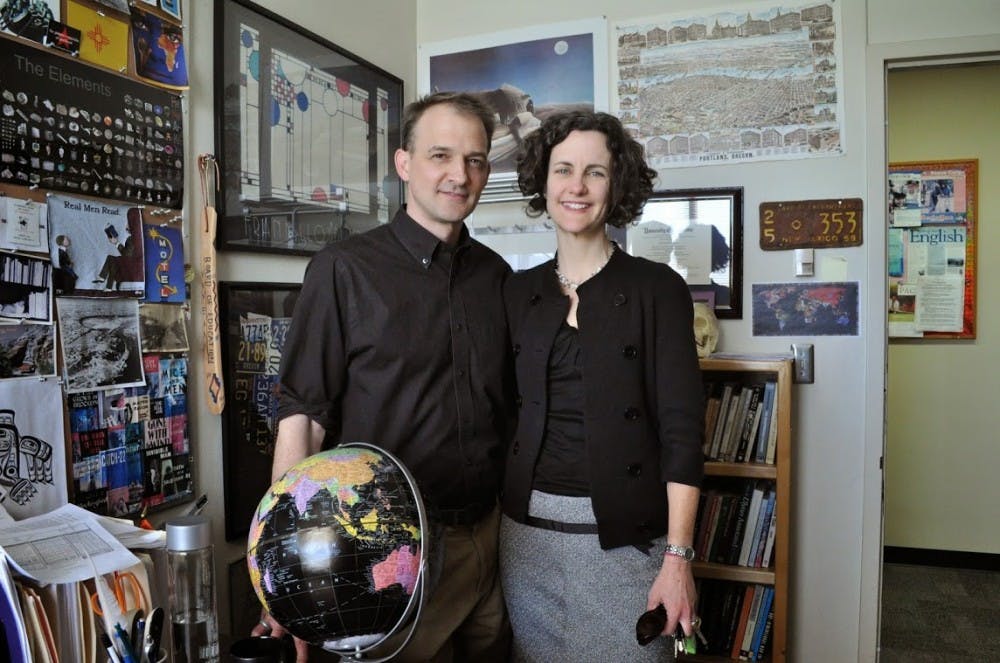Nastacia Voisin |
Chosen over hundreds of scholars applying for a handful of highly competitive placements, English professors and married couple Lars Larson and Molly Hiro have been awarded Fulbright U.S. Scholar Teaching Grants to India.
They’ll be embarking to the southeast Asian country in August with their two daughters to teach comparative American literature courses and enjoy the international experience as a family.
It’s unusual for couples to be selected for Fulbright awards to the same country in the same year, and Hiro and Larson are honored and excited to spend five months of their sabbatical teaching together in India.
“We wanted the challenge,” Larson said. “We wanted to figure out what questions we were not asking in life. To step outside of the American bubble, and see what it means to be human outside of that definition.”
Only recently alerted of their successful applications, Hiro and Larson are making practical preparations as they await details on their placements. They hope to be assigned the same university in New Delhi, teaching courses in their respective areas of interest and allowing India to revitalize their intellectual and personal perspectives.
“One of the downsides of working in American literature is that you don’t have global interests,” Hiro said. “As a professor, I’m very excited to allow this to change my scholarship.”
It was Hiro’s wanderlust that inspired the couple to apply for Fulbrights. Neither she nor Larson studied abroad as undergraduates, so after attending a Fulbright workshop in summer 2012, Hiro saw a second chance for travel.
The couple chose India as their destination not because of research interests, but in hopes that the vast number of grants offered in that country would increase their chances of both being selected. And pragmatic considerations aside, they expect their experience in India to be a mix of work and vacation.
Last summer Hiro and Larson researched India through books, films and histories in order to craft intelligent application proposals, but they recognize there’s a limit to what they can prepare for.
They are swift to note the diverse challenges they’ll face: language barriers, infrastructure troubles, bureaucratic red tape, sickness from exposure to unfamiliar foods and microbes, the relentless heat, cultural misunderstandings and possibly adjusting their teaching styles.
Also their two children – soon to be 7 and 10 – have never left the country and may be five months without formal education. Since American and international schools in India have long waitlists, Hiro and Larson might prefer their daughters to learn by exploring the cultural and historical aspects day-to-day of India.
“We fully expect, from how different life in India is – how hot it is, how crowded, how conspicuous they’ll be – they won’t think it’s fun on a daily basis,” Hiro said. “But we hope and believe that they’ll look back with a kind of fondness and feel like they’ve learned a lot.”
Senior English major Cerice Keller, who worked as Hiro’s research assistant, said Larson and Hiro’s humility and self-awareness will help them adapt to life in India.
“They are so deserving of this,” Keller said. “I can’t wait to hear about their experiences when they get back.”
Hiro said the English department has been very supportive, despite how unusual it is to lose two professors to sabbatical at once. English professor Geneviève Brassard will replace Hiro as department chair July 1, and a one-year replacement with a doctorate will be hired as an adjunct to teach American and introductory literature courses. An additional adjunct will be brought on if necessary next fall.
Hiro and Larson plan to return to the States in early January, and spend the second half of their sabbatical researching and writing. They’re excited to discover how taking American literature abroad will reshape their viewpoints, and how a semester in a foreign country will bring them closer together as a family.
It’s that challenge of defamiliarization, according to Larson, that’s central to this Fulbright teaching experience.
“Portland, as everybody knows, is a comfortable town, it’s smug and self-conscious,” Larson said. “We want to get outside of this pristine zone and maybe bring back some things Portland may have forgotten.”








